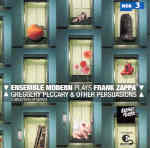It’s about time. More than a decade after the release of its first Zappa album, Yellow Shark, the redoubtable Ensemble Modern has put together another marvelous program of musical gems from one of the 20th century’s most inventive and iconoclastic composers. Kooky titles aside, the music ranges from the zany (The Beltway Bandits, which sounds kind of like Messiaen with a rock beat) to the terrifying (Naval Aviation in Art?). Zappa the beguiling melodist comes to the fore in Peaches En Regalia, while Revised Music For Low Budget Orchestra is a miniature tone poem teeming with invention and ceaselessly entertaining licks for the various players.
Indeed, the one quality that characterizes all of Zappa’s music is its inexhaustible drive and superabundance of ideas. No matter how outrageous, it’s important to remember that he was an extreme perfectionist, one who (like Conlon Nancarrow) despaired that his music ever could be played by human beings in real time with the necessary precision and attention to detail that he required. Yellow Shark demonstrated that in the right hands his work indeed can be played, and more to the point, should be. One of Zappa’s favorite composers was Edgard Varèse, and his spirit hovers over a lot of this music, particularly in the gestural language of works such as Put A Motor In Yourself (and arranger/transcriber Ali N. Askin seems to have picked up on this as well, particularly in the writing for woodwinds). So much in this music anticipates by years the trendy classical/rock fusion pieces so common today among the younger generation of composers, the difference being that Zappa’s seriousness all went into his compositional craft rather than into creating music expressive of little more than a tedious and inflated sense of the composer’s own self-importance.
The highlight of this collection is the hilarious and typically Dadaist nightmare The Adventures of Greggery Peccary. It’s impossible to describe what happens in the course of this 21-minute freak show, composed more or less along the lines of Peter and the Wolf for narrator(s) and orchestra, and indeed despite the extreme clarity of the sonics, events come at you so quickly that it’s difficult to take it all in at once–but that only means you have reason to listen to it again, so no problem there. Suffice it to say that Zappa’s demented sense of musical and verbal humor gets a complete workout with a compositional bravura and split-second sense of timing that would make Looney Tunes legend Carl Stalling proud.
As with all of the performances here, the playing of Ensemble Modern under Jonathan Stockhammer is astoundingly perfect, the sound brilliant and ideally suited to the material in both clarity and impact. Let’s hope we don’t have to wait another decade for the next Zappa project from these forces, and that some enterprising conductor (Esa-Pekka Salonen perhaps?) will tackle the big orchestral works as well.
































